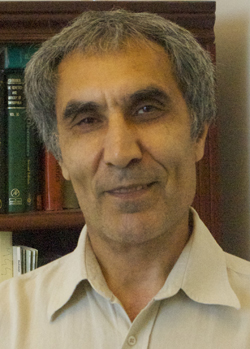Entrevista com o Dr. Alireza Rezaie

Nesses últimos meses, tivemos a visita do Professor convidado Dr. Alireza R. Rezaie aqui no IBqM.
O professor Rezaie atualmente é professor na Saint Louis University School of Medicine nos Estados Unidos e sua pesquisa é focada principalmente na compreensão dos mecanismos de interação entre as proteases da coagulação e co-fatores, substratos e inibidores, além da interação dessas proteases com receptores da superfície da célula endotelial.
Para conhecer um pouco mais sobre o Dr. Rezaie, seus projetos de pesquisa e sua visita ao Brasil, fizemos uma breve entrevista com ele.
Confira!
.: Entrevista com Professor convidado do IBqM – Dr. Alireza R. Rezaie :.
IBqM: Could you please briefly describe how did you become interested in the academic career?
Dr. Rezaie: I was very much interested to become a physician when I was a little child. However, later on I realized that I am more interested in conducting medical research than seeing patients. Therefore, I decided to obtain a Ph.D. in biological/biochemical field and conduct medical research. In pursuing my goals, following graduation from Boston University in 1989, I began to work as post-doctoral fellow in Howard Hughes Medical Institute at Oklahoma Medical Research Foundation (OMRF), studying the structure and function of coagulation proteases and their inhibitors. I worked for ten years at OMRF at different capacities and was able to obtain several grants for my work from the National Institute of Health. In 1999 I moved to St. Louis University School of Medicine as a professor and continue to work on the structure, function and physiology of blood coagulation factors.
IBqM: Could you please describe your current research project(s)?
Dr. Rezaie: I work on two main research projects in my laboratory. The first project primarily focuses on understanding the mechanism through which coagulation proteases recognize their physiological target molecules in circulation (i.e., cofactors, substrates and inhibitors) with high degrees of specificity. My other research project focuses on understanding the mechanism by which coagulation proteases interact with endothelial cell surface receptors, in particular protease-activated receptors (PARs) to elicit diverse intracellular signaling responses under different (patho)physiological conditions.
IBqM: Have you been to Brazil before?
Dr. Rezaie: Yes, this is my third trip to this beautiful country. My first trip was in 2006 when I was an invited speaker to 35th Annual meeting of the Brazilian Society on Biochemistry and Molecular Biology (SBBq) which was held in July 1-4 in Aguas de Lindoia. I was also an invited speaker for 39th Annual SBBq meeting in 2010 (May 18 to 21) which was held in Foz do Iguacu. In this third trip I am participating in teaching a course to graduate students at the Institute of Medical Biochemistry.
IBqM: Could you please make any comments on how science is developed in Brazil?
Dr. Rezaie: In my opinion science in Brazil has developed tremendously during the last decade. I have noticed much more high impact publications from Brazilian scientists in recent years. I have met many Brazilian scientists, postdoctoral fellows and graduate students during my three visits to Brazil. Their scientific knowledge and dedication to research and education has impressed me a lot. The quality and the caliber of scientific research being conducted in Brazil are very high. I firmly believe that science has a very bright future in Brazil and will even flourish more rapidly as the universities and research institutes begin to get more support from the people and the government.
Fonte: http://biochemweb.slu.edu/people/faculty/rezaie.shtml